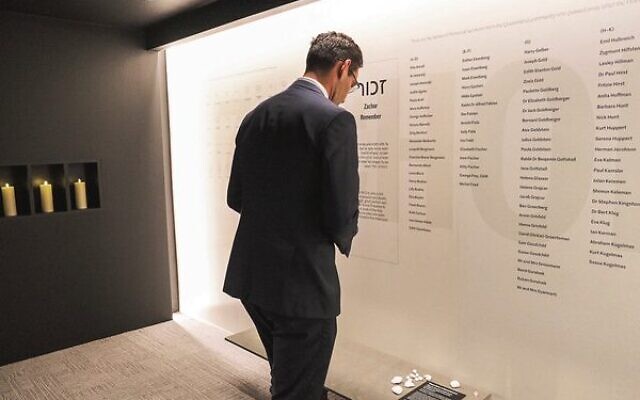The power of words, both said and unsaid
Throughout history Jewish people have faced persecution, and yet we continue to not only survive but to prosper.
The reality of the scale of the Holocaust, of six million lives, is beyond human comprehension. But we can see the schools, parks, synagogues and community centres. I have walked through the hubs of Jewish life, that are now museums and monuments in Warsaw, Krakow and right across Germany.
In prewar Germany there lies a small town, Beuthen, in modern day Bytom in Poland. Jews lived in Beuthen since 1395. Similar to most towns across Europe, throughout the centuries Jews in Beuthen faced expulsion and dispossession. By 1932 the Jewish population was about 3500.
They had Jewish schools, synagogues and community centres. After the Great War, the rebirth of the Polish state saw a plebiscite held to see whether Beuthen should stay in Germany or become a Polish town.
The Jewish community favoured staying in Germany.
This little town of Beuthen was home to my grandmother Gerda Cohen, who fled and became a stateless refugee roughly one week before Kristallnacht. The family she left behind were some of the first to be killed in Auschwitz in 1942. Some names we knew, some we didn’t.
My grandmother always cherished her German heritage. She spoke German and went to the German club in Melbourne. Just like the Jews of Beuthen choosing to stay in Germany, my grandmother chose to hold on to the culture of her place of birth.
Perhaps that is the greatest betrayal. The Jews were German, and proudly so. And yet they were met with laws banning Jewish businesses, violence and dispossession. The loyal Jews of Beuthen were among the first to be murdered in Bunker 1 at Auschwitz-Birkenau on February 15 1942.
Towns such as Beuthen tell the story of the Jewish people. And as we learn about the communities that were murdered, we honour and mourn those we lost. At the same time we recognise the courage, resilience and complexities of the Jewish people.
Throughout history Jewish people have faced persecution, and yet we continue to not only survive but to prosper.
Many people consider resistance to be a physical act. But what we sometimes underestimate is the power of resistance through mind and soul, through culture and community. It is because of the resilience and strength of the people who have come before me that I am proudly the 22nd Jewish parliamentarian in this country’s history.
Unfortunately, today is once again not an easy time to be Jewish, and while our traditions and culture have sustained our Jewish people for centuries, antisemitism is not the Jewish community’s problem to fight alone.
On October 7, Hamas launched a barbaric attack against Israel and the Jewish people – the largest loss of Jewish life in a single day since the Holocaust.
Two days after the attack, we saw protests outside the Sydney Opera House where they burned the Israeli flag, chanted antisemitic slogans and cheered on the barbaric attack against our fellow Jewish people.
The denial of what happened on October 7, of the murder, the sexual assaults, the motivation, has echoes of the hate of those who deny the events of our darkest moments of the Holocaust. The denial of the truth opens the arena for hate to fester in a way that I have not seen in my lifetime.
In our own backyard, Jewish businesses have been targeted with swastikas. School children have been harassed on the bus. Jewish community members have been doxxed online. And our university campuses have become gauntlets for Jewish students to run through.
The Holocaust didn’t happen overnight. It started with words. It started on the radio and in the playground. It grew when signs were placed around town boycotting Jewish businesses. And when Jewish children were told they weren’t allowed to go to school anymore.
The Holocaust started with words and was allowed to continue because of the absence of words.
As those with living memory of the Holocaust leave this world, we won’t have the opportunity to hear firsthand testimony for much longer. But that must not mean their stories and legacies are lost in history.
It is for this reason that myself, Allegra Spender and Julian Leeser started the Parliamentary Friends of the International Holocaust Remembrance Alliance (IHRA) to ensure there is always a bipartisan voice committed to fighting antisemitism.
Because learning about the past isn’t just about making sure it doesn’t happen again, it’s about actively pledging to do better.
Our words matter. When we use our words to call out hate, strongly and unequivocally, we have the power to change culture and behaviour. But when we are silent and we don’t use our words at all, we allow people to turn a blind eye. We allow hate to spread through the classrooms, radios, restaurants and playgrounds.
Calling that out is a responsibility not just for the Jewish community, but for every Australian. At four years old my grandmother was forced to leave her home for no reason other than her religion. She came to Australia and was able to build a life where she could be whoever she wanted to be.
And it’s because of the rights, freedoms and opportunities that were given to her that has allowed me the chance to represent our community in Parliament House, as a proud Jew.
Josh Burns is the federal Member for Macnamara. This is an edited verison of his speech at the Queensland Jewish Board of Deputies Yom Hashoah commemoration.


comments